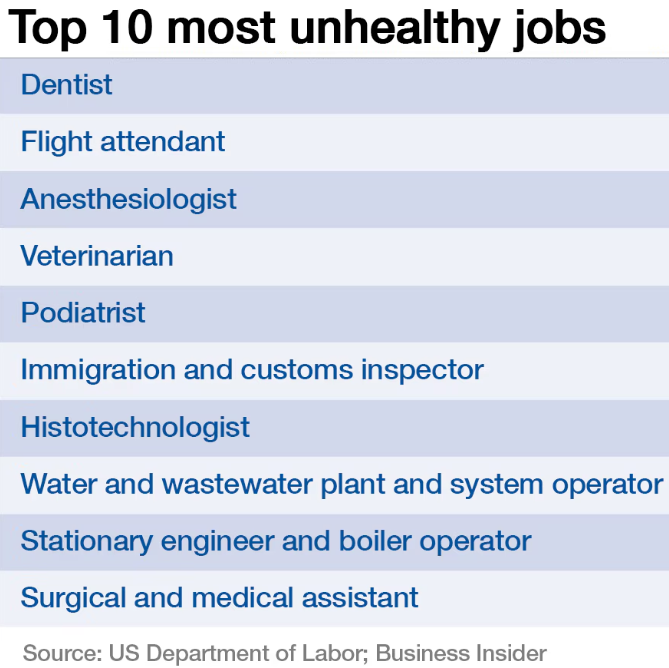Beyond the Smile: The Unseen Hazards Your Dental Team Faces Daily
When you visit the dentist, you likely envision a clean, bright environment focused on improving smiles and maintaining oral health. And while that's certainly true, there's a hidden side to the dental profession that most patients never see: Dentistry is consistently ranked as one of America's most hazardous jobs.
Surprising, isn't it? The Department of Labor and the World Economic Forum have actually placed dental careers at the top of the list for occupational hazards, citing a staggering 65.4% unhealthiness score. So, what makes a profession dedicated to health so uniquely challenging for those who work in it?
Let's pull back the curtain on the daily realities faced by your dedicated dental team:
The Silent Strain: Aches, Pains, and MSD’s
Imagine spending your entire workday in a bent, twisted, or hunched position, performing precise movements without breaks. This is the reality for many dental professionals. The constant repetitive movements, static postures, bending, reaching, and twisting, often without adequate rest, lead to an array of debilitating musculoskeletal disorders (MSDs). In fact, a shocking 96% of dental professionals suffer from chronic musculoskeletal disorders. This isn't just discomfort; it's chronic pain, potential surgery, and long term disability. They give their bodies daily to care for yours.
An Unseen Battlefield: Exposure to Contaminants and Infections
It's not just about cleanings and fillings. Dental professionals are on the front lines of exposure. From "splatter and aerosols" containing constant saliva exposure to the ever present risk of blood borne pathogens, their work is inherently "up close and personal" with bodily fluids.
Think about the high speed drills and ultrasonic cavitron handpieces. These create microscopic mists, or aerosols, laden with bacteria and viruses that can linger in the air all day. Add to that daily X-rays, and the cumulative radiation exposure which has been known to build up over time. See our blog about our Modern Dental Technology and how our Digital X-rays can reduce exposure to patients and staff. It's no wonder dentistry is ranked number one for exposure to contaminants and infections, they are literally breathing in germs and viruses while working to keep you healthy.
The Emotional Toll: Beyond Physical Strain
Beyond the physical demands and exposure risks, there's a significant emotional burden. Insufficient rest and infrequent breaks are a recipe for burnout. Dental team members often absorb the stress and anxiety of their patients, who can sometimes be nervous, anxious, or even rude. Imagine needing to remain calm, kind, and incredibly precise with sharp tools, all while managing a patient's discomfort and emotional energy. This constant absorption of external stress, coupled with the relentless pace, takes a significant mental and emotional toll.
Adding to this immense pressure, studies have shown that dental professionals face an elevated risk for mental health challenges. While statistics vary, research has frequently highlighted higher rates of anxiety, depression, and even suicidal ideation within the profession compared to the general population. The demanding nature of the work, the pressure for perfection, financial burdens (especially from student debt), and the isolating nature of private practice can contribute to a significant psychological weight that is often carried in silence. This underscores the critical need for greater awareness and support for the mental well-being of those who care for our smiles.
Appreciate Your Dental Team: They Give More Than Just Cleanings
So, the next time you're in the dental chair, take a moment to truly appreciate the professionals caring for you. Dentistry isn't just about gleaming smiles; it's a demanding, high stakes profession where dedicated individuals routinely face significant physical, biological, and emotional hazards to ensure your oral health. They put their own well being on the line, often without the robust benefits that many other hazardous professions receive.
Not all heros wear capes but some do wear loupes and gloves, and they give a lot more than just cleanings. Trust us, patient appreciation goes a long way!
Disclaimer: The information provided in this article is for general knowledge and informational purposes only, and does not constitute medical advice. It is essential to consult with a qualified dental professional or healthcare provider for diagnosis, treatment, and to address any specific dental or medical concerns.


